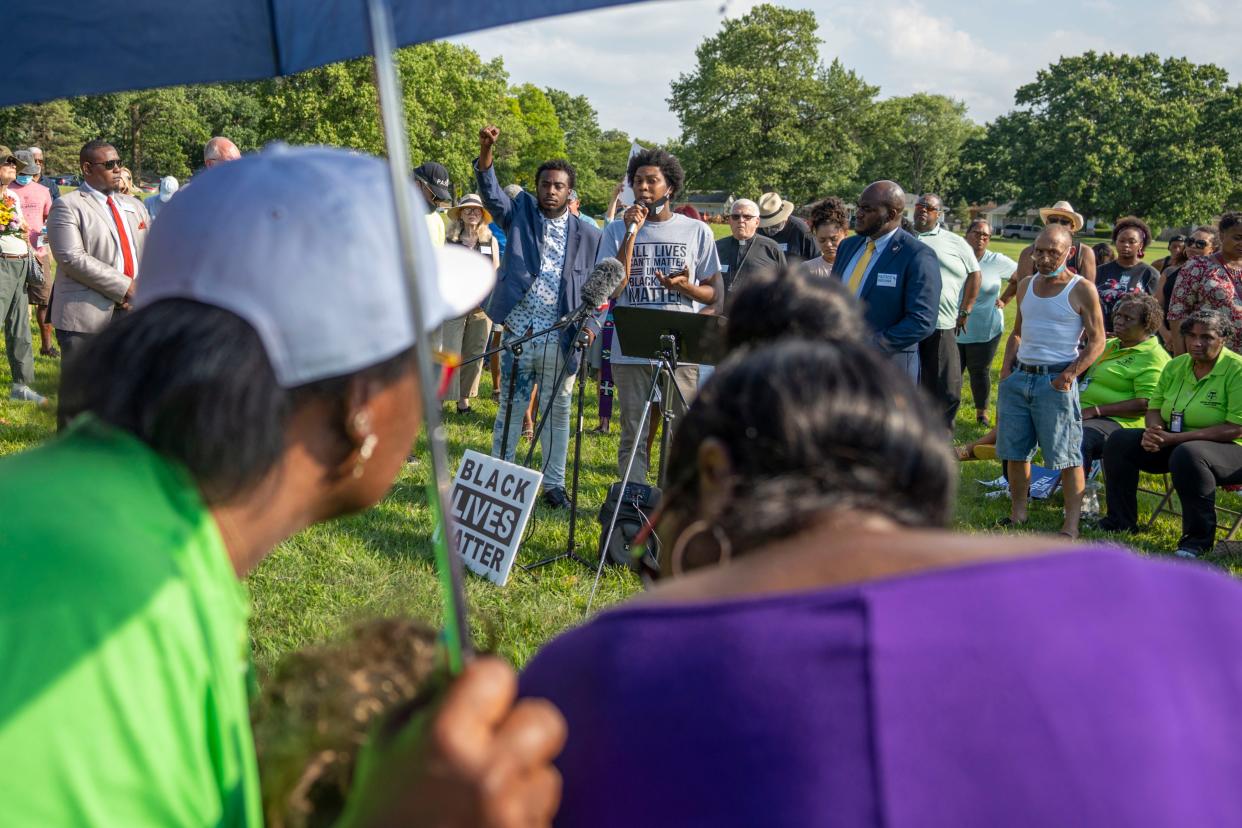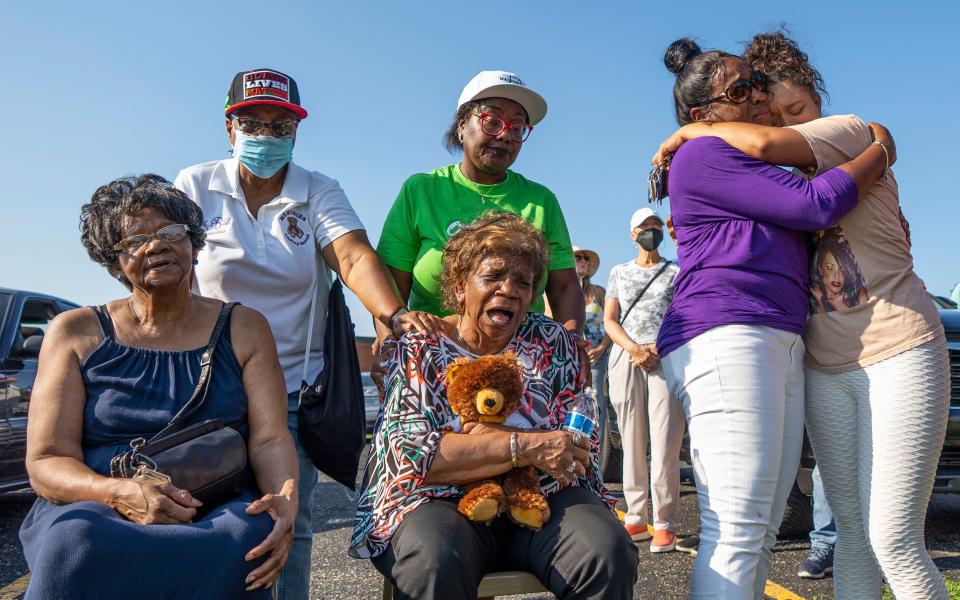Competing mental health crisis team proposals after Dante Kittrell shooting: hospital or SBFD

SOUTH BEND — A week after the shooting death of Dante Kittrell at the hands of South Bend police, community members and some city officials are increasing their calls for a mental health crisis response team.
Activists say Kittrell's death proves the fact that police are not equipped to deal with people going through mental health crises, though what an effective response to mental-health emergencies looks like is less clear.
Two South Bend Common Council members last week penned a resolution calling for a "mental health crisis response team" run through the South Bend Fire Department. However, others in the community point to the recently-created Mobile Crisis Team, run by Oaklawn, as the best way forward.
More:Linking mental illness to gun violence 'does a disservice': Q&A with Oaklawn CEO
Oaklawn's crisis team has been going to mental health calls for the past few months, according to John Horsley, Oaklawn's vice president of adult and addiction services, but it handles only calls made to the center's hotline and is not currently operational around the clock.
While discussions about the best way to handle mental-health emergencies have been going on for months and details need to be ironed out, advocates and officials agree the July 29 standoff that ended in Kittrell's death underscores the urgency of finding a solution.
“I think one of the sad realities we learned from this horrible event is that we need a crisis behavioral healthcare system — just like we have other systems — that’s competent, that intervenes at the right time with the right services and has a lot of collaborations and partnerships around it," Horsley said.
"It has to be a community response."
SWAT deployment questioned
In a vigil held Monday night community activists — including members of Faith in Indiana, Black Lives Matter South Bend and the NAACP — and Kittrell's family decried the South Bend Police Department's response to the confrontation that ended in the 51-year-old's death.
South Bend police officers shot and killed Kittrell as he paced in an open field near Coquillard School on July 29. Kittrell was threatening suicide and apparently waving a handgun in the 40 minutes before his death that police spent negotiating with him. Kittrell reportedly had a history of mental illness and witnesses maintain it was clear he was having a mental health "episode."
"My main question here is why did we need a field full of cops for a man who was only threatening himself?" asked 28-year-old Brianna Johnson, who took a video of the standoff leading to Kittrell's death.
Jeffrey Coots, a professor at John Jay College of Criminal Justice, also questioned the police response, especially the use of a SWAT team, after reviewing Johnson's video of the incident.
Coots, who is also the director of the From Punishment to Public Health Initiative at John Jay, said the initial response was appropriate, as reports of an armed man near a school should elicit a police presence. Officers then keeping Kittrell in the field while maintaining their distance was also positive, in Coots' opinion.
"The fact it lasted 45 minutes is an indication that police knew they could not solve this problem. They could contain it, but they didn’t actually have the ability to solve it," Coots said.
Once officers corralled Kittrell to one section of the field, however, Coots believes the arrival of a SWAT truck was not the right approach.
"Where I think we really see things go wrong ... is where the tactical team — the SWAT team — rolls up onto the field. If that had instead been an ambulance or a mental health crisis response team ... that would be the ideal response in this situation," Coots said.
Video of the incident shows the SWAT vehicle driving into the field near where Kittrell was standing. Within seconds, he had been shot multiple times, ending his life.
The most recent statement issued by the St. Joseph County Police Department, which is investigating the shooting along with Mishawaka police, said "SBPD officers and critical incident negotiators attempted to de-escalate the situation and calm Kittrell for nearly 40 minutes." The statement also says Kittrell threatened to shoot multiple times before pointing the gun at officers in the moments before he was killed.
He didn’t deserve this 💔
Posted by Brianna Johnson on Friday, July 29, 2022
The predominant nationwide reliance on shows of force instead of crisis intervention personnel is more reflective of political decisions surrounding funding allocation than it is of officers' tactical decisions on the scene of an incident, Coots said.
"Unless we bring in additional resources and people who are trained to do this very specific type of suicide prevention, de-escalation, it’s somewhat unfair to ask the police to solve every problem we confront," he added.
Oaklawn Mobil Crisis Team
As Kittrell's death has sparked calls for a mental health response team in the area, some in the community believe Oaklawn's pilot Mobile Crisis Team can fill that need.
Oaklawn received federal funding for the mental health unit in late 2020, Horsley said, and since then, the organization has put together a team of eight clinical social workers and peer counselors that is able to respond to mental health calls received through Oaklawn's hotline.
The hotline has been up and running since last fall and the team has been responding to calls in person since March, Horsley said. Typically, the team receives 60-80 calls a week, around 80% of which are resolved over the phone. As of early August, the unit is available only Monday through Friday from 8 a.m. to 5 p.m.
Also limiting is the fact that Oaklawn's team responds only to calls it gets through its phone line. The eventual goal, Horsley said, would be for the county's 911 center to divert situations involving a mental health episode to the Mobile Crisis Team as opposed to sending police. Getting to that point, however, is proving to be a lengthy process with the 911 center and first responders, he said.
'They took him from me:'South Bend mourns Dante Kittrell's death.
“There’s a lot of moving parts right now," Horsley said. "But, definitely the long-term plan would be for 911 to be equipped to send ... behavioral health professionals to the scene rather than professionals who are doing the best they can and not equipped to handle such situations.”
In the meantime, the Oaklawn unit plans to increase its staff and, by next spring, hopes to operate a 24/7 line for both St. Joseph and Elkhart counties.
Whether the Mobile Crisis Team could have prevented Kittrell's death, though, is unclear.
Though the standoff between police and Kittrell happened during a time when Oaklawn's team was on the clock, Horsley declined to answer if they were contacted by South Bend police about it. In general, Horsley said, Oaklawn most closely works with St. Joseph County police but has had "ongoing discussions" with SBPD leadership "about how we can be helpful to them."
A South Bend police spokeswoman declined to comment, citing the ongoing investigation.
Also unclear is how a team of mental health professionals would handle a situation involving a person going through a mental health crisis while armed with a weapon.
Horsley said the Mobile Crisis Team could respond in a variety of ways to calls where weapons are believed to be involved, though in most cases, "we would probably ask for law enforcement's help."

Coots said mental health responders in and around New York City have the most success in instances where an individual isn't armed, but he has seen cases where mental health teams and police work together on calls involving mental-health crises and weapons.
"What we want to have happen is that the police show up and stabilize the situation and then the mental health team, when they show up, can engage the person and de-escalate the situation," Coots said. "Where we see challenges is where people are acting aggressively, and then the police respond with force. And too often the individual ends up dead."
Rebekah Go, a member of Faith in Indiana who has been involved in local discussions involving mental health and law enforcement, said there is a lot that still needs to be worked out in how local police agencies and mobile crisis teams would handle certain situations. Go isn't sure if Oaklawn clinicians responding to Coquillard school would have saved Kittrell's life, but she wishes that option was explored.
"I don’t think we know the answers in this case, but those are protocols that need to be explored and hashed out," she said. "What really makes me sad [and] frustrated is that they didn’t even try."
Should fire department lead the way?
Another avenue of approach touted by residents is the creation of a mental health crisis team run out of the South Bend Fire Department. The initiative, which is support by Black Lives Matter, is detailed in a recently-filed resolution by common council members Lori Hamann and Henry Davis Jr.
"It is time to stop talking about the need for mental health professionals to be a part of a mental health crisis response team and to create and implement such a team within the South Bend Fire Department to provide alternatives to escalation, intimidation and deadly force," the resolution states.
Alternative to jail:St. Joseph County earmarks funds for behavioral crisis center
In an interview Friday, Hamann said she envisions the fire department securing funding to hire mental health clinicians and train existing personnel in the department to be able to respond to mental-health emergencies. Hamann said she's aware of Oaklawn's team, but fears the center doesn't have the resources to fill the community's need.
"We are really relying very heavily on this organization, as wonderful as they are, that is not staffed in a a way — I just think they’re going to need additional funding," Hamann said. The resolution is set to be discussed at Monday's common council meeting, though it is non-binding even if it passes.
Horsley and Go emphasized that, while they think the Mobile Crisis Team should work closely with EMS and other public agencies, mental health response teams should be run by mental health providers.
Oaklawn has "resources to on-going care, a management system and benefits that support mental health professionals, and seasoned mental health professionals that can provide appropriate supervision," Horsley said. "It is a unique service that can’t just be tagged onto systems that are already stressed."
'Like my worst nightmare':Bystander recalls witnessing, documenting South Bend police shooting
South Bend Fire Chief Carl Buchanon said he had not spoken with Hamann or Davis prior to them filing their resolution. Buchanon added that he is open to the idea of training community paramedics to serve on the Mobile Crisis Team, though the fire department currently has "no qualified mental health clinicians."
Officials also said the new behavioral crisis center, being built at Epworth Hospital in downtown South Bend, will improve mental health outcomes in the county by providing people going through mental-health emergencies an alternative to jail where they can be treated.
Though Kittrell's death was tragic and emphasizes the urgency of implementing a system to deal with mental-health emergencies, advocates feel real progress has been made.
"The fact we’re that talking about this and have some pilots in place is a huge first step," Go said. "But I feel guilty we didn’t get all the steps in place on time to save Dante’s life."
This article originally appeared on South Bend Tribune: Competing proposals for mental health crisis team: hospital or SBFD

